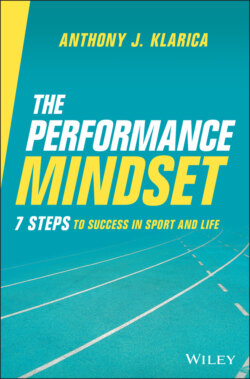Читать книгу The Performance Mindset - Anthony J. Klarica - Страница 35
Talent doesn't coach you
ОглавлениеOf course, some people will never thrive as athletes for purely physical reasons. And some sports, by virtue of their composition, make selection challenging based on physiological factors. But in most sports talent alone is not enough to forge a career or achieve goals and ambitions. At times, talent can even be counterproductive for high performance, as it seduces an athlete into thinking that all will be well because of their proven talent. But talent is not enough. Even talent and work rate are not enough.
Without the motivation to participate in hours, days, months and years of dedicated, engaged time‐on‐task, talent in sport is unlikely to be realised. A performance mindset helps sustain this motivation, manage personal and emotional challenges, overcome competing interests and demands, and utilise supports to realise talent.
Sally Pearson, Australian hurdler and 2008 Beijing Olympic Gold medallist, affirmed this view in a comment she posted on LinkedIn in 2021. She noted how annoyed she would get when it was implied that her success was attributed not to her hard work, but to the talent she was born with. Her talent, she argued, wasn't what encouraged her to train to get better, or what coached her.19
Keep in mind that this discussion extends well beyond the few athletes who are household names. Mindset skills are relevant for fringe athletes deciding how much energy to invest and how to improve. They are relevant for athletes hidden in lower ranks, who enjoy only limited game time, and for team members moving in and out of a squad. Of course, a performance mindset is also applicable beyond sport — whether you're in a classroom, at work or striving for personal development. Building a performance mindset while engaged in any trade or task will help people to perform and flourish.
This notion reflects the power of the human spirit. It was preached by Percy Cerutty, a great character in Australian sport in the fifties and sixties who coached Herb Elliott. As a runner, Herb was unbeaten over the mile and the 1500 metres. His victory in the 1500 metres at the Rome Olympics in 1960 is still widely regarded as one of the great performances by an Australian athlete.
In one of his six books, Athletics: how to become a champion, from 1960, Cerutty spoke about the power of the human spirit. ‘I do admit freely, frankly and fully that we are not all born equal in graces, brains or ability, but I do affirm that no power exists, human or superhuman, that opposes the genuine aspirations and sincere attempts of any personality to advance itself … I affirm that our destiny is in our own hands [although] no one but a fool would deny that we do find difficulties, set‐back, frustrations, even inevitabilities at times, and by the dozens — hundreds.’20
When I met and interviewed Herb in 1992, he spoke about his belief in the importance of mindset. ‘The basic ingredients for success haven't changed in 50 000 years,’ he told me. ‘They are the spirit, soul, body and mind.’ And, he added, ‘If I could pick one thing that is vital to be successful internationally, it's mental toughness. The wonderful thing about it is that you're not born with it. You can train it into yourself.’21
